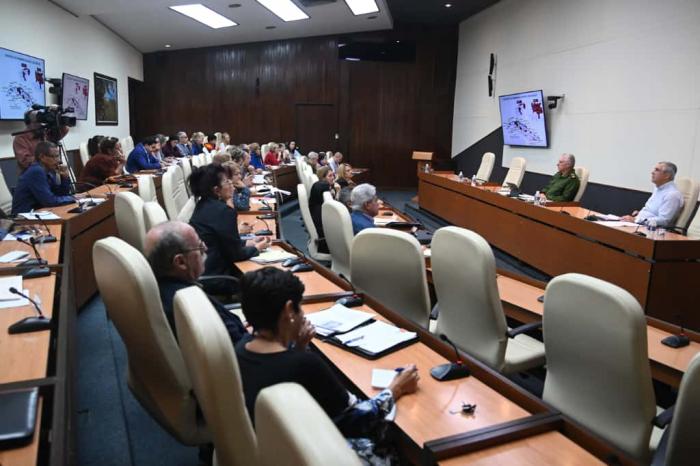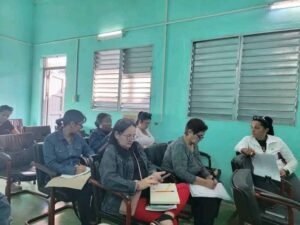«We are going to work on this epidemic in the same way as the COVID-19 was worked on,» said this Tuesday afternoon the First Secretary of the Central Committee of the Communist Party of Cuba and President of the Republic, Miguel Díaz-Canel Bermúdez, during the meeting of experts and scientists for health topics.
From the Palace of the Revolution, where specialists in various facets related to defending health converged, and among whom were known faces of those who contributed much with their knowledge when Cuba confronted the coronavirus, the Head of State convened weekly meetings to, from science, contribute analyses and solution proposals for the epidemic of cases with Non-Specific Febrile Syndrome, provoked, above all, by arboviruses.
The first point of the session – which also counted from the presidency with the Deputy Prime Minister of the Republic, Eduardo Martínez Díaz – dealt with the updating of the epidemiological situation of arboviruses on the Island. In this regard, Doctor José Raúl de Armas Fernández stated that the one just concluded is the second consecutive week with a decrease in Febrile Syndromes.
Such reality, he said, responds to the fact that in eight provinces this change has occurred – they are Havana, Matanzas, Villa Clara, Cienfuegos, Ciego de Ávila, Granma, Santiago de Cuba, and Guantánamo.
The expert affirmed that this has been an epidemic year, and that in 68 municipalities an increase in febrile cases occurred. Entering the topic of arboviruses, the Doctor detailed that 38 municipalities have been scenes of Dengue transmission; and that, in the case of Havana, in all municipalities cases of that ailment were reported.
Regarding Chikungunya, José Raúl de Armas Fernández detailed that the figure of accumulated cases amounts to 21,681 – of these, more than twenty thousand with clinical suspicion of the disease, and 692 confirmed in 14 provinces, 93 municipalities, and 151 Health areas. According to his statement, the provinces with the highest number of cases are Matanzas, Havana, Camagüey, Cienfuegos, Artemisa, and Villa Clara. It is in those territories where 98.5 percent of the cases have been concentrated.
With respect to Oropouche, from last 26th September until today no confirmed or suspected cases were reported, as commented by the expert.
Among other data of interest, Doctor of Sciences María Guadalupe Guzmán Tirado commented that 119 countries have reported transmission of Chikungunya; that due to such movement of the virus «vigilance is maintained» in the largest of the Antilles; and that, once the start of transmission in the province of Matanzas was identified, experts are now deepening studies. Once the meeting concluded, Doctor of Sciences Yagen Pomares Pérez – general director of Primary Health Care of the Ministry of Public Health -, shared valuable ideas with the journalists about an epidemic that worries many. She began speaking about the importance of identifying the problem from when the patient presents with fever.
«The fundamental objective of our system – she stated – is to achieve the admission of all patients who have febrile syndrome. This admission can be, either at home – through home admission –, or it can be based on the criteria that are already approved.»
On this last idea, she referred to a protocol that «is already approved in its second version.» And in the same line of reasoning she expressed that this is one of the experiences obtained from the days of COVID-19, «when we quickly put science, research at the service of the problem.» She stressed the necessity to «achieve the admission of the patients.»
Equally, she referred to a challenge in Primary Health Care: «Achieving the discipline of our patients with Febrile Syndrome in isolation from home is complicated, but I believe this is the first aspect» to take into account.
The second – she argued – has to do with «a follow-up from the basic Health teams.» And in that sense she spoke about how it has been organised, «from our own system,» that follow-up which counts on the reinforcement of Medical students, «from the fifth year, who already have all their competencies to be able to do it.»
According to the Doctor of Sciences’ details, that was «an experience that we worked on very intensively in Matanzas,» and that now extends to the entire country.
Regarding hospitalised patients, the expert said that «all children under two years of age with Febrile Syndrome must be hospitalised.» The same, she said, happens with pregnant women, who undergo «more exhaustive vigilance.» And in the case of adults, she commented that those who present alarm signs such as prolonged fever, loss of consciousness, permanent abdominal pains, or other worrying manifestations should be hospitalised.
Elderly adult patients – as Yagen Pomares Pérez explained to the press – should also be hospitalised, because they are more vulnerable, because they usually have comorbidities like arterial hypertension, diabetes, or others that put life in danger.
Actions on the ground
«We all know that the principal concern our population has today is the adulticide treatment, the fumigation,» commented to the reporters Doctor Madelaine Rivera Sánchez, national director of Vigilance and Vector Control of the Ministry of Public Health. She explained that «it has not been possible to reach all places, as we have been accustomed to during all the years we have had epidemic outbreaks.»
The specialist said that work has been ongoing, «concentrating the teams at the municipal level, to be able to reach the most complex zones, where we have evidence of arbovirus transmission.» And she affirmed:
«Based on analyses we have done in the country, and on technical matters we have been able to review, we are now going to have equipment that will allow us to reinforce actions above all in the municipalities that today have the greatest complexities with respect to transmission, above all of Chikungunya.»
The Doctor stated that «we are trying to cover all urban zones where we can reach not only where we have evidence but also where people tell us there is presence of cases, and thus be able to carry out the adulticide treatments.»
In another necessary assessment, the expert affirmed: «A problem we have had in this stage, is that precisely in these two weeks of treatment that we have been working on in November, there are some provinces where it has not gone well because teams have remained on the ground; and these are among the matters we are going to reinforce.»
She spoke of giving follow-up to everything that is done, because what is inadmissible, she said, is to have the equipment, the insecticide, even the fuel today, and not obtain the expected results due to a deficit of forces. What it is about, she stressed, is to prepare them for the sake of quality, which is what is vital.
The doctor also emphasised community participation: «Intersectorality, the risk perception of all of us, and the support are very important so that the vector control actions can be carried out.»
We are speaking of an ailment, she said, «that has had a very rapid transmission velocity due to the presence of the mosquito; and it is against the vector that we must continue carrying out the principal actions to be able, in the shortest time possible, to solve this problem that is affecting the entire population.»




